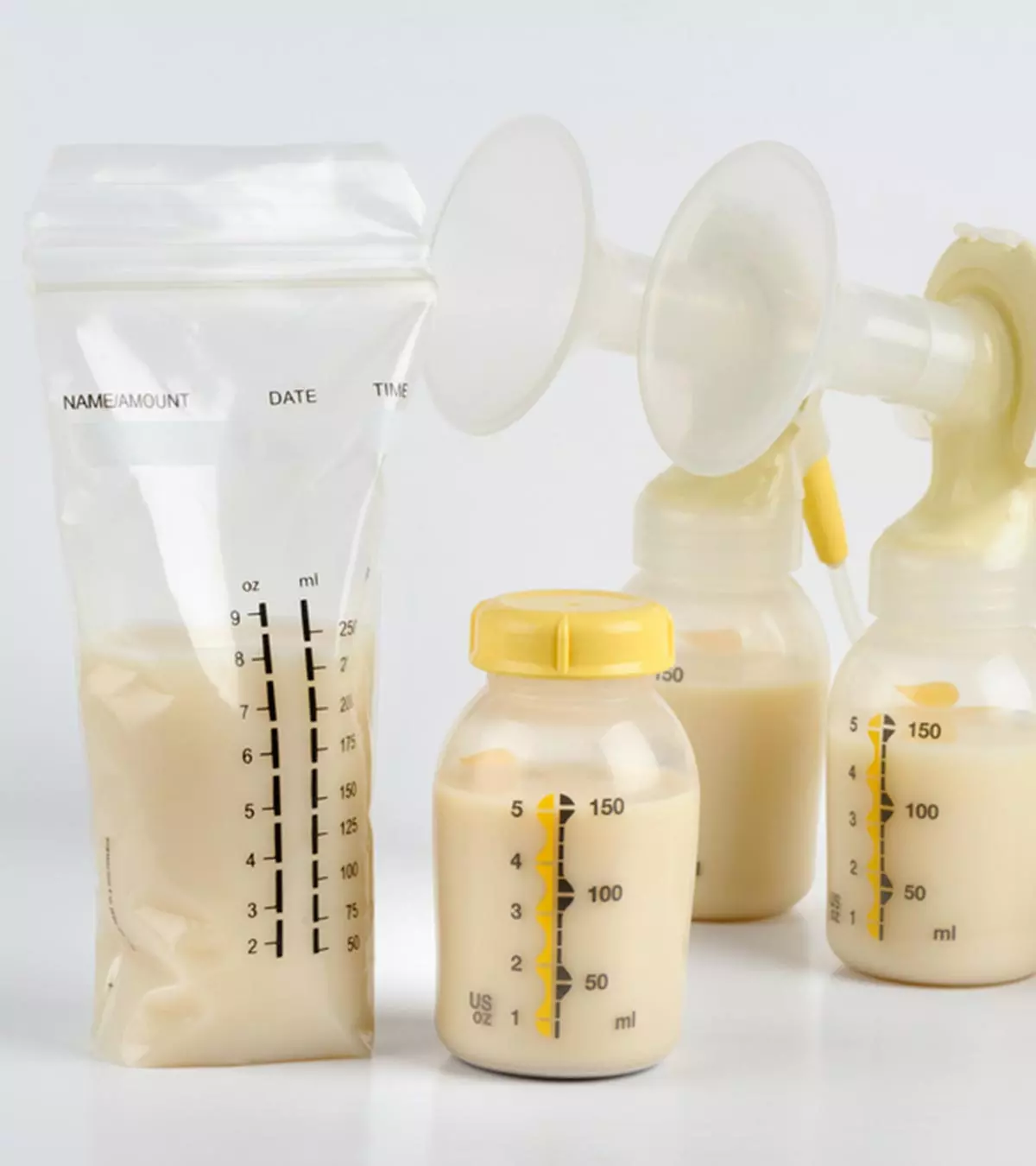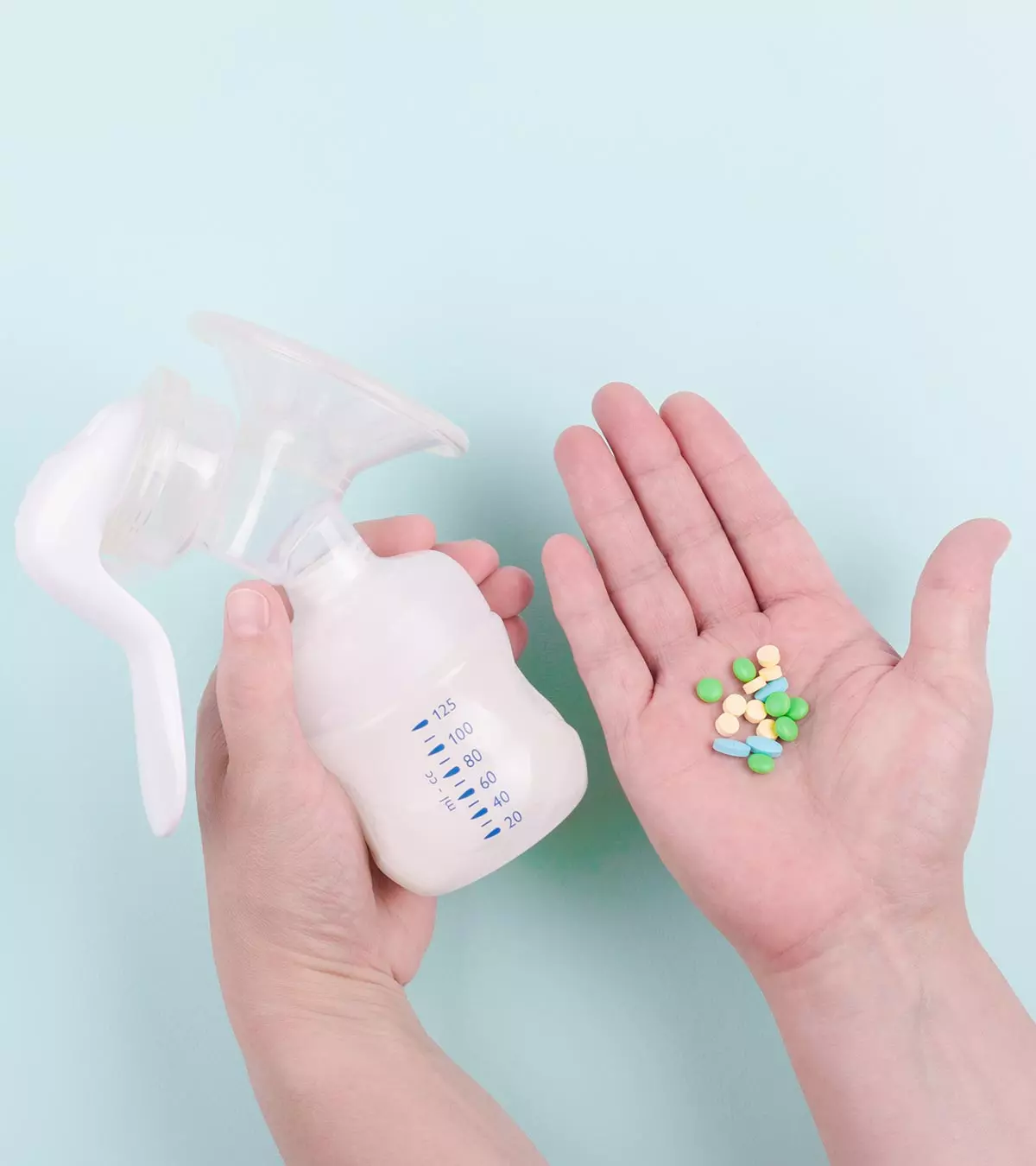
Image: ShutterStock
After pregnancy, a few mothers may experience anxiety attacks, panic disorders, or postpartum depression. Citalopram or Celexa is a common antidepressant prescribed by a medical professional considering its potency. But, you may wonder, “Is Celexa safe during breastfeeding?” As you’re breastfeeding, there is a chance for the over-the-counter (OTC) drug Celexa to reach the baby through the milk, which may restrict you from taking this antidepressant. Keep reading the post as we have included information on Celexa to clear your doubts. However, if you are still confused, visiting the doctor could help you.
Key Pointers
- Celexa is generally considered safe for use while breastfeeding but transfers into breast milk in low amounts.
- Infants may experience increased fussiness and drowsiness due to Celexa use by the mother.
- If the mother used Celexa during pregnancy, the doctor may advise her to continue using it while breastfeeding.
- Mothers who take Celexa while breastfeeding may experience side effects such as dry mouth, nausea, fatigue, and muscle pain.
- Seek immediate medical attention in case of dizziness, chest pain, hallucinations, high fever, or swelling in your hands, feet, throat, tongue, or lips.
What is Celexa (Citalopram)?

Image: Shutterstock
Celexa is the brand name of the drug Citalopram. Citalopram is an antidepressant, which falls in the category of selective serotonin reuptake inhibitors (SSRIs). Citalopram is used to treat anxiety, depression, and some other mental conditions such as panic disorder (1).
SSRIs increase the level of serotonin in the brain. Serotonin is a neurotransmitter that helps with mental balance and improves mood. SSRIs are effective in the treatment of postpartum depression. According to a 2018 report by the US Centers for Disease Control and Prevention (CDC), it has been found that among American women who have given birth, the prevalence of postpartum depressive symptoms was 13.2%. SSRIs are also used during pregnancy to treat severe depression and anxiety symptoms (2) (3).
Is It Safe To Use Celexa While Breastfeeding?
Celexa is generally safe to use while breastfeeding. However, like all drugs, Citalopram also transfers into your breast milk but in low amounts. The common side effects in your baby due to your Citalopram use are increased fussiness and drowsiness. Citalopram doesn’t cause any adverse effects on the development of nursing infants.
- If you used Celexa during your pregnancy and if you have depression symptoms after delivery, your doctor may ask you to continue using Citalopram. However, your doctor may ask you to monitor your baby’s behavior for any side effects (4).
- If you have been using Citalopram during your pregnancy, your doctor is not likely to change the medication while you are nursing your baby. But in cases of preterm births, your doctor may prescribe you a drug that passes into breast milk in even lower amounts than Celexa (5).
- If you are a nursing mother, use Citalopram while breastfeeding only if your doctor approves it.
Side Effects Of Celexa While Breastfeeding
Celexa can cause many side effects while you are breastfeeding (1).
- Dry mouth
- Nausea
- Heartburn
- Diarrhea
- Stomach pain

Image: Shutterstock
- Constipation
- Excessive fatigue
- Muscle pain
- Loss of appetite
- Frequent urination
- Weight loss
The safety of taking Celexa while breastfeeding is not guaranteed, and it can also cause side effects that may require immediate medical attention.
- Shortness of breath
- Dizziness
- Chest pain
- Confusion
- Hallucinations
- High fever
- Excessive sweating
- Rash or blisters
- Swollen hands, feet, throat, tongue, or lips
- Poor concentration or problems with memory
- Seizures
 Caution
CautionUsing SSRIs While Breastfeeding
The use of SSRIs such as Citalopram is generally considered safe during breastfeeding and may not affect maternal health. Nursing infants do not experience any major side effects or developmental problems with maternal use of SSRI drugs.

Image: Shutterstock
But your doctor may prescribe you SSRIs while you are breastfeeding only when it is necessary for your health. If you haven’t been taking any antidepressant in pregnancy, your doctor may prescribe you a drug that secretes into breast milk in the least possible amounts. Citalopram may not be your doctor’s first choice of SSRI while you are breastfeeding if you have not been using it during your pregnancy or before it (4). There are several medications that are compatible with breastfeeding and no mother should feel like she has to choose between breastfeeding and taking care of her mental health concerns.
 Point to consider
Point to considerHandling Depression While Breastfeeding
Many women suffer from depression due to extreme physical and emotional changes after giving birth. Untreated depression can cause severe damage to a woman’s health. Therefore, if your doctor considers it absolutely essential to prescribe you a safe antidepressant drug while you are breastfeeding, you can consider using it without fear of severe side effects (6).
- Women with postpartum depression can experience many symptoms such as negative thoughts, decreased appetite, difficulty sleeping, irritability and panic attacks.

Image: Shutterstock
- Celexa is considered an effective medicine to treat postpartum depression. So, talk to your doctor about its benefits versus side effects for you to treat your depression or anxiety symptoms.
- Seek support from your partner and family, which can be extremely beneficial for sufferers of depression.
Postpartum depression in no way means that you are a bad or inadequate mother. It is a medical condition that is treatable. So, seek your doctor’s advice and take antidepressants they prescribe.
Frequently Asked Questions
1. Does citalopram decrease milk supply?
No, studies indicate that citalopram increases prolactin levels and galactorrhea in non-nursing women. However, it does not show any such effect on women who have established lactation. Therefore, the medication does not affect your milk supply (7).
2. Should I breastfeed if I have depression?
Yes, studies suggest that breastfeeding enhances mother and child interaction and thus positively affects maternal mental health (8).
3. How does Celexa affect the baby’s development and growth while breastfeeding?
While a small number of instances have reported drowsiness and decreased weight gain, most studies have not observed any adverse consequences in infants who were breastfed by mothers who took Celexa (10).
4. Can Celexa cause any interactions with other medications that the mother may be taking while breastfeeding?
Regarding Celexa, studies have shown that the levels of citalopram in breast milk are relatively low. Most breastfeeding infants exposed to citalopram through breast milk show no adverse effects. It’s crucial to inform your healthcare provider about all your medications, including prescription drugs, over-the-counter medications, and herbal supplements. They can assess the potential interactions and guide you and your baby on the safest approach.
5. Can Celexa affect the baby’s sleep patterns or behavior while breastfeeding?
In some cases, infants exposed to SSRIs through breast milk may exhibit changes in their sleep patterns, such as increased drowsiness or difficulty sleeping (11). If you notice any such signs, it’s advisable to consult with your healthcare provider.
Celexa or citalopram is a common antidepressant available OTC. The drug does not cause any major complications, but it may cause increased crankiness and sleepiness in babies as it passes into breast milk. While the drug is usually considered safe and does not pose a risk for nursing mothers, it is strongly recommended to use it only with the doctor’s consent. The doctor will evaluate your mental health requirements and prescribe the drug if necessary.
Infographic:Taking Celexa When Breastfeeding
Celexa or Citalopram is an SSRI that acts as an antidepressant. Several women have been found to encounter postpartum depression and are prescribed SSRIs when breastfeeding. Doctors prescribe such medications after assessing the risks and benefits for both the mother and baby. The infographic below summarizes some important points regarding the safety of taking Celexa when breastfeeding.

Illustration: Momjunction Design Team
Illustration: Celexa While Breastfeeding - Everything You Need To Know

Image: Dall·E/MomJunction Design Team
Wondering if antidepressants, like Celexa, are safe for your postpartum depression Learn about the risks and benefits of these drugs while nursing your baby. Get the facts to make an informed decision.
References
- Citalopram.
https://medlineplus.gov/druginfo/meds/a699001.html#:~:text=Citalopram%20is%20used%20to%20treat - Selective serotonin reuptake inhibitors (SSRIs).
https://www.nhs.uk/mental-health/talking-therapies-medicine-treatments/medicines-and-psychiatry/ssri-antidepressants/overview/#:~:text=It’s%20thought%20to%20have%20a - Franco De Crescenzo et al.; (2014); Selective serotonin reuptake inhibitors (SSRIs) for post-partum depression (PPD): a systematic review of randomized clinical trials.
https://pubmed.ncbi.nlm.nih.gov/24139299/ - S. Misri et al.; (2000); Are SSRIs safe for pregnant and breastfeeding women?
https://www.ncbi.nlm.nih.gov/pmc/articles/PMC2144975/?page=4 - Citalopram | Escitalopram (Celexa® | Lexapro®).
https://mothertobaby.org/fact-sheets/citalopramescitalopram-celexalexapro-pregnancy/pdf/ - What Is Postpartum Depression?
https://www.psychiatry.org/patients-families/postpartum-depression/what-is-postpartum-depression - Citalopram.
https://www.ncbi.nlm.nih.gov/books/NBK501185/ - Carley J. Pope and Dwight Mazmanian; (2016); Breastfeeding and Postpartum Depression: An Overview and Methodological Recommendations for Future Research.
https://www.ncbi.nlm.nih.gov/pmc/articles/PMC4842365/#:~:text=Further%2C%20these%20benefits%20were%20found,to%20improved%20maternal%20mental%20health - Citalopram.
https://www.ncbi.nlm.nih.gov/books/NBK501185/# - Citalopram
https://www.ncbi.nlm.nih.gov/books/NBK582639/#:~:text=There%20have%20been%20a%20fewcitalopram%20or%20escitalopram%20during%20breastfeeding. - Antidepressants and Breastfeeding
https://www.breastfeedingnetwork.org.uk/factsheet/antidepressants/
Community Experiences
Join the conversation and become a part of our nurturing community! Share your stories, experiences, and insights to connect with fellow parents.
Read full bio of Morgan Jackson
Read full bio of Jessica Albert
Read full bio of Rohit Garoo
Read full bio of Vidya Tadapatri

















